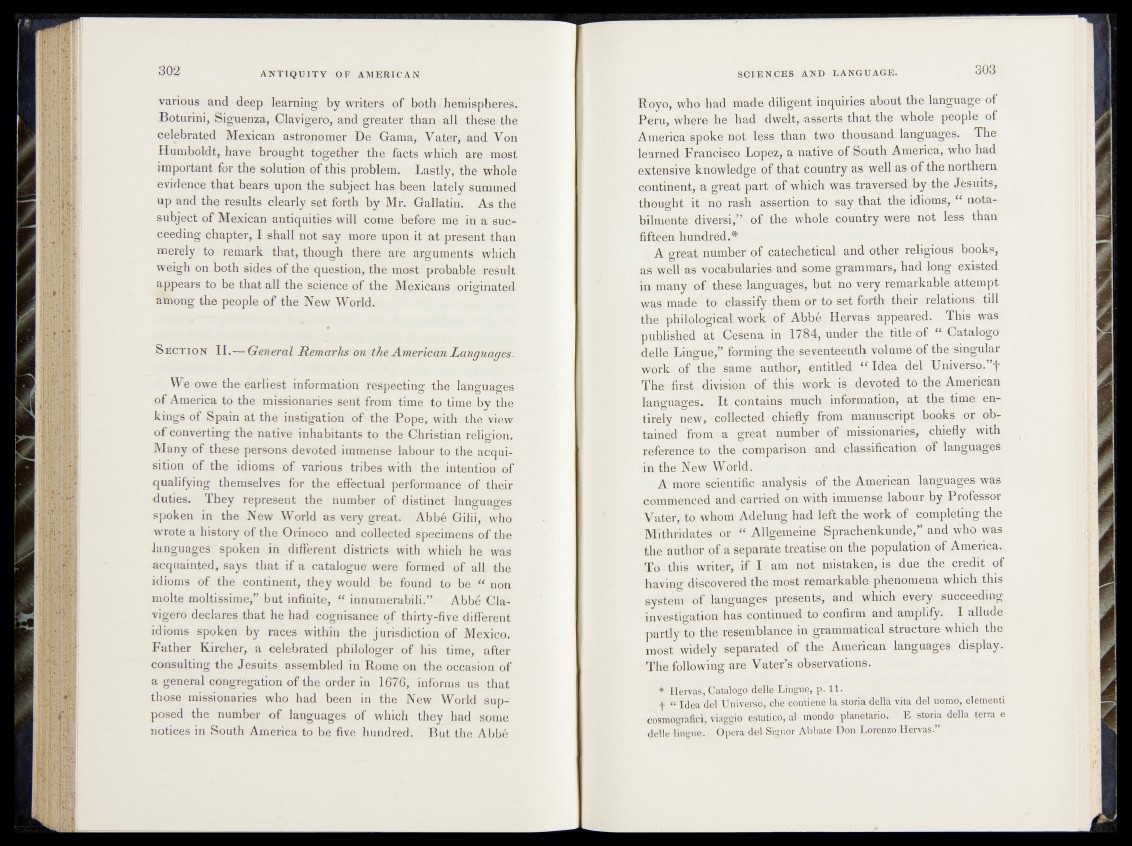
various and deep learning by writers of both hemispheres.
Boturini, Siguenza, Clavigero, and greater than all these the
celebrated Mexican astronomer De Gama, Vater, and Von
Humboldt, have brought together the facts which are most
important for the solution of this problem. Lastly, the whole
evidence that bears upon the subject has been lately summed
up and the results clearly set forth by Mr. Gallatin. As the
subject of Mexican antiquities will come before me in a succeeding
chapter, I shall not say more upon it at present than
merely to remark that, though there are arguments which
weigh on both sides of the question, the most probable result
appears to be that all the science of the Mexicans originated
arnong the people of the New World.
S ec t io n General Remarks on tfye American Languages.
We owe the earliest information respecting the languages
of America to the missionaries sent from time to time, by the
kings of Spain at the instigation of the Pope, with the view
o f converting the native inhabitants to the Ghiistianreligion.
Many of these persons devoted immense labour to the acquisition
of the idioms of various tribes with the intention of
qualifying themselves for the effectual performance of their
duties. They represent the number of distinct languages
spoken in the New World as very great. Abbé Giliqiwho
wrote a history of the Orinoco and collected specimens of the
languages spoken in different districts with which he was
acquainted, says that if a catalogue were formed of all the
idioms of the continent, they would be found to be “ non
moite moltissime,” but infinite, “ innumerabili.” Abbé Clavigero
declares that he had cognisance of thirty-five different
idioms spoken by races within the jurisdiction of Mexico.
Father Rircher, a celebrated philologer of his time, after
consulting the Jesuits assemblai in Rome on the occasion of
a general côngregation of the order in 1676f informs us that
those missionaries who had been in the New World supposed
the number of languages of which they had some
notices in South America to be five hundred. But the Abbé
Royo, who had »made diligent inquiries about the language of
Peru, where he had dwelt, asserts that the whole people of
America spoke not less than two .'thousand languages. The
learned Francisco Lopez, a native of South America, who had
extensive knowledge of that country as well as of the.northern
continent, a great part of which was traversed by the Jesuits,
thought it no rash assertion.to -(say that the idipms, “ nota-
bihnente diversi* of the whole, .country were not less than
fifteen hundred.*
A great number of catechetical and other religious books,
as well as vocabularies and some grammars, bad long existed
in many of these languages, but no very remarkable, attempt;
vmSKmadë to classify the® or to set forth their relations till
the philological work of Abbé.yHervas appeared. This was
published at .Cesena in 1784, under the title óf Catalog©
deffe Lingue,” forming the seventeenth volume ,of the^ingular
work of the same author, entitled “ Idea del Univêtso'./’f
The first: division .of this work is .devoted) to the American
languàgeS. It contains much information, at tfiu time entirely
new, collected chiefly from manuscript books or obtained
from a great number of missionaries, chiefly with
reference t© - the comparison and .classification,, of language
in thé „New World.
. A move scientific analysis of the-American languages- \yas>
commenced and carried on with immense labour by Professor
Vater, to whom Adelung had left the work|fg§ .completing the
Mithridates or “ Allgemeine Sprachenkunde,-and who wasy
the author of a separate treatise on the population of America.,
To this writer, if I am not mistaken, is da,e the qredit of
having discovered the most remarkable phenomena which this'
system of languages presents, and which, every succeeding
investigation has Continued to co n firm ed amplify. I allude»
partly to the resemblance in grammatical structure which the
most widely separated of the American languagesljdisplay.
The following are Vater’s observations. ;
* Hervâs, Catalogo.'ja^e.fiîugue, p. tL ,,
4 “ Idea del Unive&öi'tfiis conti ehé la 'stóïridella vita del uomoÿ élê^enir
cosmografrcii, viaggio éstâtiôdfà môndo- plaoetafiO. '4.È storia Mla terra e
dClle M-rtgue’. ' Opéras dëtSigrör Àbbate t>on Loreazo Hervas.” »